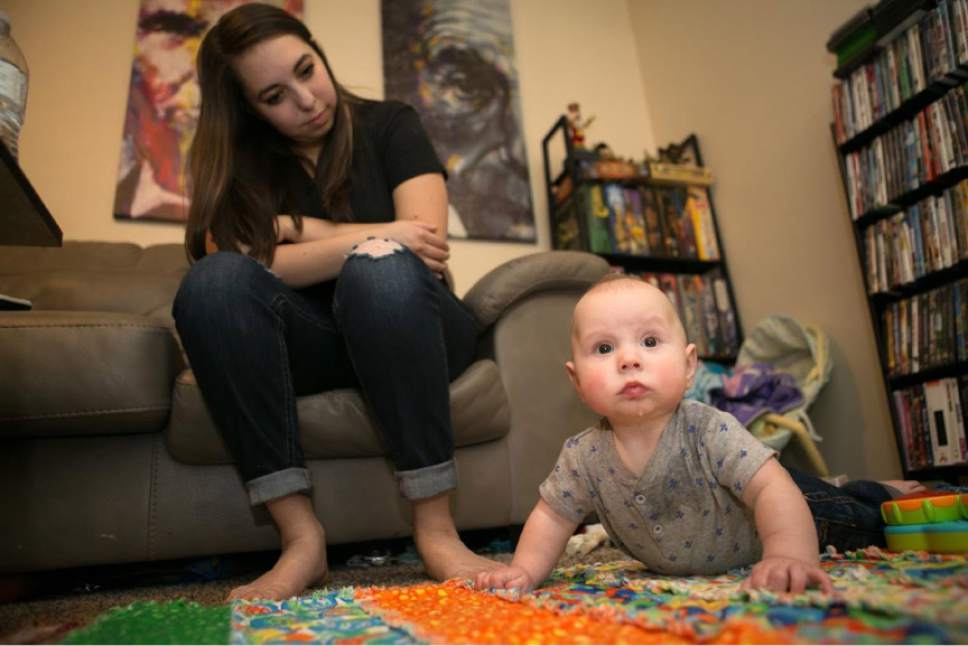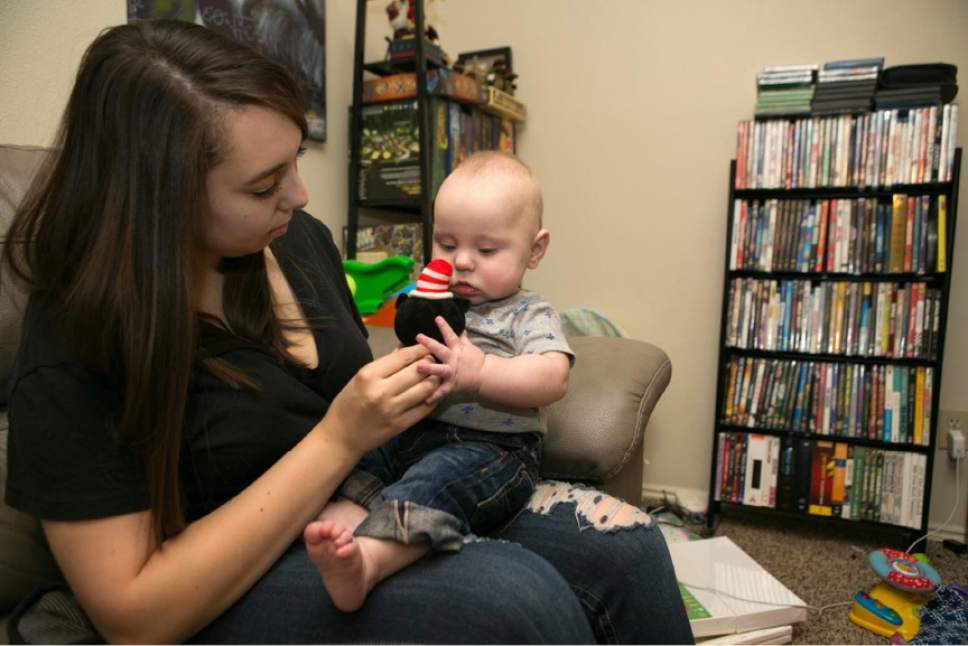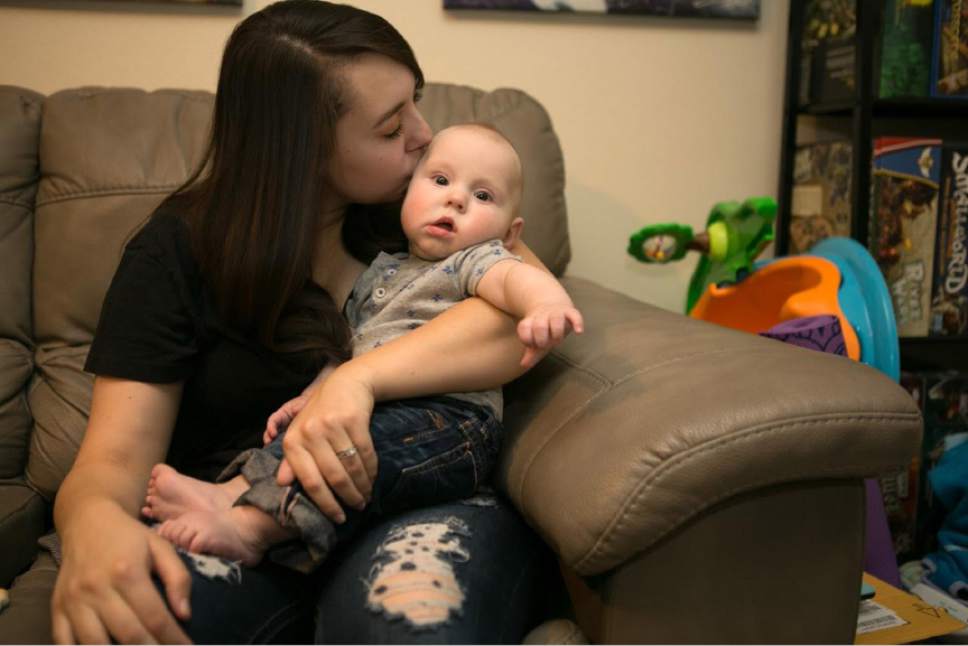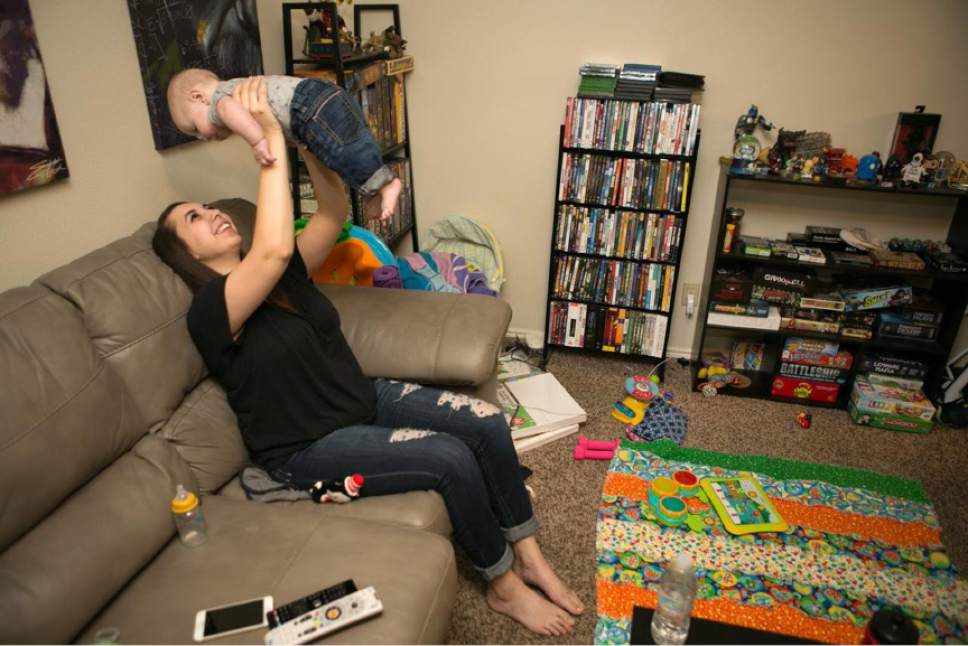This is an archived article that was published on sltrib.com in 2017, and information in the article may be outdated. It is provided only for personal research purposes and may not be reprinted.
Lori's gut twisted as she answered her daughter's unexpected phone call, the flurry in Cedar City's Garden House restaurant fading into the background.
"Mom, I need to talk to you," Kaitlyn said in April 2013. "I was raped."
Lori got up from the table, her mind churning. She had to get to Kaitlyn, a Southern Utah University freshman whose apartment was three blocks away. But first she had to call the police.
That call alone made Kaitlyn's case unusual. A 2014 Department of Justice report found that 80 percent of rapes and sexual assaults of female college students were not reported to police from 1995 to 2013.
"I just did ... everything you read about and hear about and are taught" to do when this happens, Lori said. "I didn't hesitate. My daughter was raped: I need to call the cops; I need to get this going."
The Salt Lake Tribune generally does not name sexual assault victims; Kaitlyn and her mother agreed to be identified by their first names.
Over the next nearly two years, Kaitlyn's case would continue to be an example of what can happen when a victim receives support. The process wasn't flawless; Kaitlyn said she received none of the campus services offered to students who report sexual assaults under a federal law known as Title IX.
But unlike many college victims of sexual assault, Kaitlyn remained in classes at her school — and, in December, she completed her degree.
—
Detectives with 'so much compassion' • Kaitlyn stared at her apartment wall in April 2013, black fingerprint powder marking the spot where a day earlier she had desperately grasped the door frame as fellow SUU student Aaron Price dragged her into the spare bedroom.
She had just returned to her apartment after an invasive rape exam. The sight of her fingerprints brought the details flooding back.
How she told Price, then an SUU rugby player, "no" as he carried her into the bedroom; how he pried her legs apart with one hand while pinning her to the bed with the other; how she eventually became too tired to fight, the police report states.
His words repeated in her memory: "I love you," he continued to tell her as he assaulted her, she told police. He told her "everything would be OK and that he would help her through this," the police report states.
Officers had arrived at Kaitlyn's apartment right after her mother's call. Police found Price later that same day, and Kaitlyn said she was relieved when he immediately confessed, telling officers he "took things too far and forced her to have sex with him," according to the police report. Price declined to be interviewed by The Tribune.
"The detectives had so much compassion; they never made Kaitlyn feel bad and they informed us all along the way of everything that was going on," Lori said. "They got the evidence and they called and said, 'We're going on a manhunt' ... Twenty minutes later, they said he was in custody."
Cedar City police Chief Darin Adams said the swiftness of Lori's call and Kaitlyn's cooperation helped police build a strong case.
"Everything seemed to fall into place," he said, "from the onset of the complaint to her obvious willingness to get involved early on, [and] give a description of what occurred so we could begin laying the foundation," gather evidence and quickly find Price.
—
Feeling safe on campus • Kaitlyn got a cat to keep her company in her suddenly terrifying apartment. She went to counseling. She stayed in school, plowing through classes to keep her mind occupied.
"I told myself, after everything that happened, that I wouldn't let this get to me and I wouldn't let it be a negativity in my life," she said. "I don't want to be held back by this."
It was a huge help, Kaitlyn said, that Price was no longer at SUU. Kaitlyn said SUU officials did not reach out to her to make her aware of services or share information. Instead, police told her that school officials had taken action to keep Price off campus, she said.
So, she didn't have to worry about running into him on her way to class or another activity — a fear often cited by sexual assault victims who drop out of school.
Victims leaving school pose "a significant challenge," though no study exists examining their dropout rate, said S. Daniel Carter, board secretary for SurvJustice, a nonprofit that provides legal assistance to survivors of sexual violence.
"There have been calls for more research on this question, as it truly does get to the crux of the negative effect of failing to address the problem, and, from a fiscal perspective, how badly it undercuts public investment in higher education," Carter said.
The challenge of staying in school is even more difficult, Carter added, when "appropriate remedial action is not taken" by schools to help victims — despite their obligations under Title IX.
That law, which bars sex discrimination in education, requires universities to swiftly respond to and resolve complaints of sexual violence. They must provide students who report sexual assaults with immediate services, such as counseling and changes in housing, classes or assignment due dates, if requested.
But Kaitlyn said she didn't know Title IX existed. She arranged for counseling on her own. And she took her finals days after the assault, unaware she could request a delay.
Donna Eddleman, a Title IX coordinator at SUU at the time of Kaitlyn's assault, said she could not recall her case. However, she said it was standard procedure for Cedar City police to inform the university if a student was accused of sexual assault. At that point, she said, the school would typically issue an "interim suspension" — meaning the accused student could be denied unrestricted access to campus — pending a university investigation.
It is the school's policy to offer services to alleged victims known to be students, said Eddleman and Ann Marie Allen, SUU's director of ethics and compliance, who currently oversees Title IX.
"We have a responsibility to students regardless of where they reported," Eddleman said
School officials might not reach out if police don't alert them that a victim was a student, or if they learn a student victim does not want the university involved, she added.
Allen would not comment on a specific case, but said the university would connect a student victim with the school's counseling center as well as the Title IX office, which works with others on campus to make any necessary changes to classes and housing. Cedar City police continue to communicate with SUU about safety issues, she said, and for an accused student, the school's investigation "can result in discipline, suspension or expulsion."
—
A conviction secured • The Iron County attorney's office charged Price with first-degree felony rape, punishable by five years to life in prison.
Rape cases, typically, are difficult to prosecute, said David LaBahn, president and CEO of the Association of Prosecuting Attorneys.
"The issue in rape is it must be forcible and consent likely will be the issue," LaBahn said. "The issue of consent, many times, is compounded by ... potentially a lack of evidence collection or gathering."
Such corroborating evidence can include text messages, torn clothing, surveillance videos or testimony from people who saw an alleged victim or an alleged attacker before or after an incident.
In Kaitlyn's case, police gathered evidence that supported her description of the assault — such as the fingerprints on the wall and DNA from the bedroom and her rape kit. And Price confessed to police.
But prosecutors offered a plea deal to Price, who pleaded guilty to attempted forcible sex abuse, a lesser charge punishable by up to five years in prison.
County Attorney Scott Garrett told The Tribune his office had "concerns about the strength of the evidence and the consensual nature of the intercourse."
Despite his confession, Price stood before Judge Keith Barnes at his sentencing in January 2015 and said he thought what happened was consensual.
"First, I'd like to apologize for the misunderstanding that happened that night," Price said in a court recording. "I never meant to hurt Kaitlyn, I obviously misread some signals she was giving."
Price was sentenced to 180 days in jail.
Aric Cramer, Price's attorney at the time, said his client didn't get off easy. Price lost his job and "he's going to be on the sex [offender] registry for the rest of his life," Cramer said. "Sex cases are more difficult than murder cases … and trying to discern what really happened is dang near impossible. ... The mere allegation of a sex crime literally destroys a person's life."
Kaitlyn said she supported the plea deal largely because she was nervous about testifying. She now wishes she had.
"Part of me wishes it had gone to trial," Kaitlyn said, "so he could have had more time in jail."
Statistics show, however, that Price spent more time in jail than most alleged attackers. Out of every 1,000 rapes, the Rape, Abuse and Incest National Network estimates, 11 cases get referred to a prosecutor. Seven of those cases will lead to a felony conviction and six of those defendants will be incarcerated.
—
'She is a survivor' • Kaitlyn, now 22, no longer has nightmares. In fact, she doesn't really think about the assault anymore.
She's happy about getting her college degree, but doesn't feel especially triumphant; she simply wasn't going to let Price interrupt her life.
She credits much of this attitude to her mother, who encouraged her to get counseling and was there when she needed support.
"It really helped that my mom still lived in Cedar [City]," Kaitlyn said. "If I was having a hard day, I could call my mom and she could come over or I could sleep at her house."
Kaitlyn's now-husband, whom she met the summer after her assault, has been a tremendous help, too. At first it was hard to spend time with him alone, she said, but soon he became her rock through the turbulent legal process.
He holds her tight during rape scenes in movies and TV shows, she said, and calms her fears when she worries about the possibility of running into Price.
The couple recently welcomed a baby boy, and Lori said it's clear that being a mother has helped Kaitlyn heal.
"This little guy, he is the light of her world," Lori said. "Being a wife and mother has helped her realize she is a survivor."
— Reporter Jessica Miller contributed to this report.
astuckey@sltrib.com Twitter: @alexdstuckey











